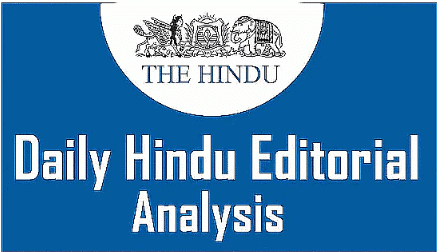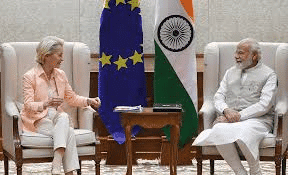UPSC Exam > UPSC Notes > Current Affairs & Hindu Analysis: Daily, Weekly & Monthly > The Hindu Editorial Analysis- 17th January 2025
The Hindu Editorial Analysis- 17th January 2025 | Current Affairs & Hindu Analysis: Daily, Weekly & Monthly - UPSC PDF Download

An Alliance of Democracies with India at its Core
Why in News?
The article emphasizes the need for stronger collaboration between Europe and India to address global challenges, focusing on trade, defense, technology, and geopolitical dynamics. It advocates forming a democratic alliance to counter the rising influence of autocratic powers like Russia and China.
- Importance of EU-India Partnership: The relationship between Europe and India is crucial for shaping the future of democracies.
- Historical Context: While the strategic intent behind EU-India relations has been strong, effective delivery has been lacking.
Challenges in EU-India Relations

- Prolonged FTA Negotiations: The focus on the Free Trade Agreement (FTA) for over 17 years has hindered progress in other important areas of collaboration.
- Need for a Successful FTA:. successful FTA is vital to counter rising protectionist trends and strengthen economic and geopolitical ties between the world’s largest democracy and its biggest trading bloc.
- Moving Beyond Trade
- Importance of Geostrategic Issues: While the FTA is important, there is a need to focus on geostrategic issues that go beyond trade.
Key Areas for High-Level Political Dialogue:
- Economic security through resilient supply chains.
- Defense cooperation to address shared security challenges.
- Joint innovation in areas like space exploration, emerging technologies, and critical industries such as pharmaceuticals.
Geopolitical Dynamics and Shared Challenges
- Europe and India’s Geopolitical Landscape: Both Europe and India face complex geopolitical challenges. Europe has expressed frustration over India’s response to Russia’s invasion of Ukraine and its historical ties with Moscow.
- India’s Strategic Balancing Act: India’s engagement with Russia and China reflects its strategic need to navigate complex rivalries and avoid being drawn into rigid power blocs.
- Shared Threat of Autocratic Powers: The partnership between Russia and China poses a mutual threat to democratic nations, necessitating a united front.
- Building a Practical Framework
- Incremental Trade and Investment: Gradually break down barriers to trade and foster investment in critical industries.
- Supply Chain Resilience: Reduce dependence on China by creating alternative supply chains, positioning India as a “Trusted Partner.”
- Defense Collaboration: Accelerate EU-India defense discussions to complement India’s strong ties with the U.S. and enhance security guarantees.
- Technology Leadership: Deepen cooperation in emerging technologies like quantum computing and biotech to counter China’s global dominance.
Strengthening Defense and Technology Collaboration
- Model from U.S.-India Defense Cooperation: India’s defense partnership with the U.S. serves as a model for EU-India defense collaboration.
- Scaling Up EU-India Defense Collaboration: Europe should invest in and provide advanced weapons to India, reducing its reliance on Russian arms.
- Promising Areas for Collaboration: Space exploration and emerging technologies offer significant opportunities for mutual benefit.
- Enhancing the Trade and Technology Council (TTC): The EU-India Trade and Technology Council should be utilized more effectively to prioritize collaboration in critical and emerging technologies.
- Drawing Inspiration from U.S.-India Initiatives: Europe and India can draw inspiration from the U.S.-India iCET initiative to strengthen cooperation in critical technologies.
- A Broader Vision for EU-India Ties
- Fostering People-to-People Connections: Strengthening educational and cultural exchanges can deepen mutual understanding and build trust based on shared democratic values.
Conclusion
- India’s Economic Potential: India is expected to become the world’s third-largest economy in the coming decade, presenting vast opportunities for Europe.
- Strategic Goal: The aim should be to form a robust alliance of democracies with India as a central pillar, addressing shared challenges and promoting tangible collaboration.
- Building a Democratic Coalition: By embracing mutual strengths and fostering cooperation, Europe, India, and the U.S. can build a strong democratic coalition capable of countering autocratic powers and ensuring a secure and prosperous future.
The document The Hindu Editorial Analysis- 17th January 2025 | Current Affairs & Hindu Analysis: Daily, Weekly & Monthly - UPSC is a part of the UPSC Course Current Affairs & Hindu Analysis: Daily, Weekly & Monthly.
All you need of UPSC at this link: UPSC
|
38 videos|5293 docs|1118 tests
|
Related Searches
















